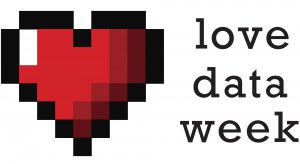
Love Data Week is coming February 8!
Love Data Week (Feb. 8 to 12) is an international celebration of all things data! Each year we hope to engage with our community on issues like data management, sharing, wrangling, and visualization, as well as open and reproducible science. This year we are excited to celebrate with the official launch of the new Center for Data and Bioinformation Services (CDABS) at the Health Sciences and Human Services Library (HSHSL) and a week of activities.
Schedule
Ongoing – All week
- Visit the UMB Data Catalog. Explore the great research being done at UMB. Talk to us about cataloging your datasets! For more on the Data Catalog check out this video introduction!
- Take part in ICPSR’s Adopt a Dataset program. ICPSR is an extensive repository of social, behavioral, and political data and the official organizer of Love Data Week. Choose a dataset from their list to adopt and share insights about it on social media.
- Share why you love data on Twitter. Be sure to use the hashtags #LoveData21 and #UMBLovesData
Monday Feb. 8
Noon
Introduction to the Center for Data and Bioinformation Services
Join us for an information session to learn more about the Center for Data and Bioinformation Services (CDABS) and discover the many ways we can work with you at all stages of your research. CDABS is the new hub for data and bioinformation learning, services, resources, and communication at the Health Sciences & Human Services Library. Register
12:30PM-2:00PM
CDABS Launch Party!
Hang around after our introductory session, bring your own refreshments and celebrate the launch of the new Center. We are available to talk about anything you want and party! Register
Tuesday Feb. 9, Noon
Best Practices for Research Data Management
Get organized and avoid a “data disaster”! This workshop provides basic strategies and best practices for effectively managing research data to ensure its organization and accessibility. Topics covered include: funder and journal requirements for data management and sharing, standards for file naming and structure, resources for data management planning and sharing, and strategies for storing data during research and preserving it for the future. Register
Wednesday Feb. 10
Noon
Writing Data Management Plans with DMPTool
Researchers, do you have an upcoming grant application that requires you to write a data management or data sharing plan? Are you striving to maintain well-organized research projects? In this workshop, we will cover the components of good data management plans with a particular eye toward NIH data sharing requirements. Participants will also be introduced to DMPTool, an online platform which provides plan templates and guidance from most major funders. Additionally, we will be providing participants with time during the workshop to work on plans for their own projects and ask questions and receive guidance from the instructors. Register
1:00PM – 2:00PM
Open Data Office hours
Meet one on one with the CDABS team to talk about any questions or concerns. We can help with data management challenges, R programming, choosing visualizations, finding data, and developing a sharing strategy. Get signed up for All of Us Researcher Workbench, create an ORCID ID, or take a tour of our High-Performance Computer. Register
Thursday Feb 11, Noon
Introduction to GitHub
This online workshop will provide a rich overview of GitHub.com – what it is, why use it, and how. Participants will take a guided tour of GitHub’s main features, including project management, collaboration, and web publishing capabilities, and explore the endless amount of code, data, and other projects shared by millions of others on GitHub. The workshop is well suited for researchers working with data or software scripted tasks, as well as anyone with an interest in GitHub or open source collaboration. Register
Friday Feb 12, 11am
Getting Connected to your Data – A Reproducible Workflow for Data Wrangling
Wrangling. Munging. Data Sanitation. These and other names describe an aspect of the data analysis life cycle typically thought of as boring and unglamorous, but which occupies the majority of time spent during a data analysis project. The time you spend in preparing your data for analysis, while crucial, cuts into the time available for using software to produce a visualization, calculate a statistic, or run a favorite machine learning algorithm. The goal of this seminar is to provide a reproducible workflow for performing your own data wrangling. I will suggest methods to help you to: 1) get to know your data, 2) cultivate habits that will help you to spend less time on wrangling, and 3) optimally prepare your data for the output you’re interested in producing. Register
For questions contact Jean-Paul Courneya, Bioinformationist and Amy Yarnell, Data Services Librarian at data@hshsl.umaryland.edu.

